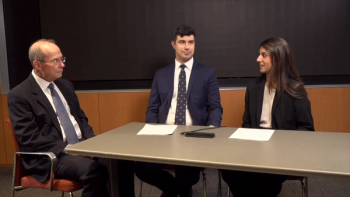
Cataract surgery in uveitic glaucoma eye can have good result
Physicians also can focus on treating inflammation and IOP in patients
Patients with uveitic glaucoma have diverse presentations. Carefully planned cataract surgery can be successful.
Reviewed by Mark A. Werner, MD
There is no longer any reason to dread cataract surgery in eyes with uveitic glaucoma, according to Mark A. Werner, MD,
“They can do quite well,” he said.
Dr. Werner points to more and better options for steroid delivery and systemic immunosuppression, as well as better knowledge of the importance of aggressively managing inflammation in these patients. In addition to those factors, modern surgical techniques are less traumatic to the eye, he added.
“If patients have poor outcomes now, it is more likely due to posterior segment complications of the underlying uveitis,” Dr. Werner said.
Problems arise
Potential problems in uveitic glaucoma patients often are linked to their specific disease. For example, a patient with pars planitis is more likely to have
“It is important to counsel patients on that,” Dr. Werner said. In patients with juvenile idiopathic arthritis, surgeons can improve outcomes with aggressive suppression of inflammation. Glaucoma and hypotony are both concerns, Dr. Werner added.
Anecdotally, Dr. Werner said he has noticed that patients with
RELATED:
Watch inflammation
Surgeons should also consider how long a patient has gone without inflammation. Dr. Werner said a patient should experience three months with no inflammation before a good outcome is backed by evidence.
“In
“For anterior intraocular lens opacity or membranes, you can use a YAG laser beam, turn off the retrofocus, avoid the central lens and the iris, and turn the laser energy down, once the eye is quiet,” Dr. Werner said.
Dr. Werner shared information on a patient he treated with rheumatoid arthritis that was reasonably controlled with low-potency steroids. The patient had visually significantly cataracts, posterior synechiae, and IOP that was not well controlled. When evaluating the patient’s optic nerve.
Dr. Werner saw that she had pre-perimetric glaucoma. He performed
Triamcinolone (
RELATED:
Disclosures:
Mark A. Werner, MD
E: [email protected]
This article was adapted from Dr. Werner’s presentation at the American Glaucoma Society annual meeting. Dr. Werner is a speaker for Bausch + Lomb
Newsletter
Don’t miss out—get Ophthalmology Times updates on the latest clinical advancements and expert interviews, straight to your inbox.





























